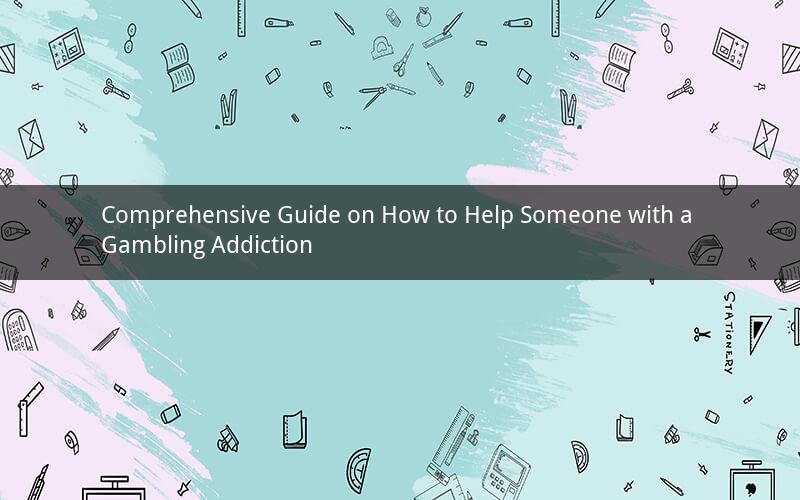
Introduction:
Gambling addiction is a serious issue that affects millions of individuals worldwide. It is characterized by an uncontrollable urge to gamble, despite negative consequences. If you know someone struggling with a gambling addiction, it is important to understand how to offer support and assistance. This article provides a comprehensive guide on how to help someone with a gambling addiction, including strategies for intervention, communication, and resources for recovery.
1. Recognize the signs of gambling addiction:
Identifying the signs of gambling addiction is crucial in providing appropriate support. Common signs include:
a. Preoccupation with gambling: The individual constantly thinks about gambling, planning their next bet, or reliving past gambling experiences.
b. Inability to control gambling: The person finds it difficult to stop gambling, even when they know it is causing problems in their life.
c. Lying to hide gambling activities: They may lie about the amount of money they have spent or the time they have spent gambling.
d. Borrowing money to gamble: The individual may borrow money from friends, family, or take out loans to fund their gambling habits.
e. Neglecting responsibilities: Work, school, and personal relationships may suffer due to the time and money spent on gambling.
2. Approach the individual with empathy and concern:
When addressing someone with a gambling addiction, it is important to approach them with empathy and concern rather than judgment. Consider the following tips:
a. Choose an appropriate time and place: Find a quiet and private setting to have a conversation without distractions.
b. Be non-judgmental: Avoid lecturing or making accusations, as this can lead to defensiveness and resistance.
c. Express your concerns: Clearly explain the negative consequences of their gambling behavior and how it affects you and others.
d. Offer support: Let them know that you are there to help and that you want to support them through this challenging time.
3. Encourage them to seek professional help:
Professional help is essential for overcoming a gambling addiction. Here are some steps to encourage the individual to seek assistance:
a. Research treatment options: Provide information about different types of treatment, such as counseling, therapy, and support groups.
b. Encourage them to talk to a therapist: A therapist can help them understand the underlying causes of their addiction and develop coping strategies.
c. Suggest attending a support group: Support groups like Gamblers Anonymous can provide a community of individuals who share similar experiences and offer mutual support.
d. Offer to accompany them to appointments: Show your commitment to their recovery by accompanying them to therapy sessions or support group meetings.
4. Help them create a financial safety plan:
Gambling addiction often leads to financial problems. Help the individual create a financial safety plan to prevent further damage:
a. Set a budget: Work with them to create a realistic budget that accounts for their essential expenses and savings.
b. Cut off access to credit: Encourage them to close credit card accounts or freeze their bank cards to prevent further gambling-related debt.
c. Seek financial counseling: A financial counselor can help them manage their finances, create a repayment plan, and address any existing debt.
d. Monitor their spending: Keep an eye on their financial activities to ensure they are sticking to their budget and not engaging in risky gambling behavior.
5. Provide ongoing support:
Supporting someone with a gambling addiction is an ongoing process. Here are some ways to provide continuous support:
a. Be patient: Recovery from addiction is a gradual process, and setbacks are possible. Offer patience and understanding during this time.
b. Encourage self-care: Encourage the individual to engage in healthy activities, such as exercise, hobbies, and socializing, to help them cope with cravings and stress.
c. Maintain open communication: Keep the lines of communication open, allowing them to express their feelings and concerns without fear of judgment.
d. Celebrate milestones: Acknowledge and celebrate their progress, no matter how small, to reinforce their commitment to recovery.
Conclusion:
Helping someone with a gambling addiction requires empathy, patience, and a willingness to support them through their recovery journey. By recognizing the signs of addiction, approaching the individual with care, encouraging professional help, creating a financial safety plan, and providing ongoing support, you can make a significant difference in their life.
Questions and Answers:
1. What is the first step in helping someone with a gambling addiction?
The first step is to recognize the signs of gambling addiction and approach the individual with empathy and concern.
2. Can a gambling addiction be cured?
While there is no quick fix, a gambling addiction can be overcome with the right support, treatment, and commitment to recovery.
3. How can I help my loved one stay motivated during their recovery process?
Encourage self-care, maintain open communication, and celebrate milestones to help your loved one stay motivated.
4. What if my loved one is resistant to seeking help?
Be persistent in offering support, research treatment options, and encourage them to talk to a therapist or join a support group.
5. How can I support my loved one financially during their recovery?
Create a financial safety plan, cut off access to credit, seek financial counseling, and monitor their spending to help them manage their finances responsibly.